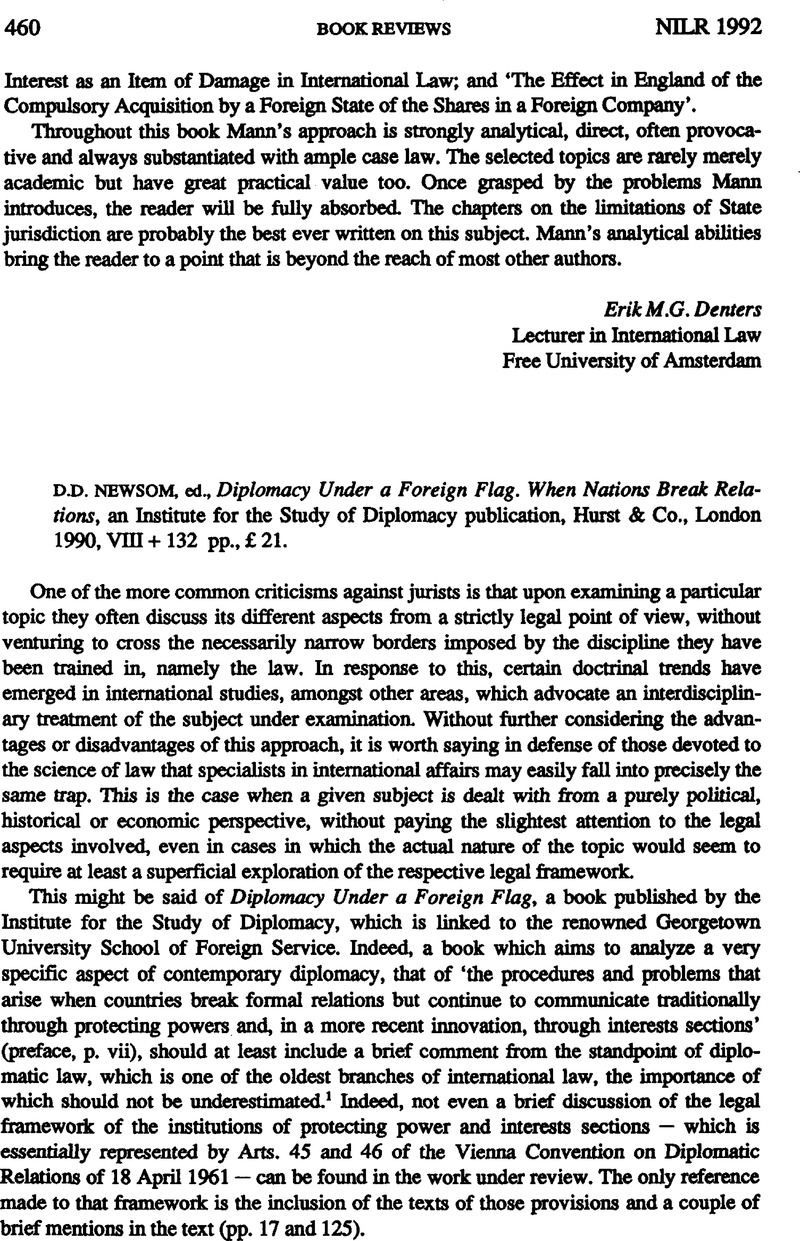No CrossRef data available.
Article contents
D.D. Newsom, ed., Diplomacy Under a Foreign Flag. When Nations Break Relations, an Institute for the Study of Diplomacy publication, Hurst & Co., London1990, VIII + 132 pp., £21.
Published online by Cambridge University Press: 21 May 2009
Abstract

- Type
- Book Reviews
- Information
- Copyright
- Copyright © T.M.C. Asser Press 1992
References
1. The International Court of Justice recently had the opportunity to examine certain aspects of diplomatic law, in the case concerning the United States Diplomatic and Consular Staff in Tehran. In dealing with mis case, the Court did not miss the chance to stress an several occasions the ‘fundamental character’ of what it called ‘the whole corpus of international rules of which diplomatic and consular law is comprised’ (ICJ Rep. (1980) p. 42, para. 91. See also ICJ Rep. (1979) p. 19).
2. ICJ Rep. (1980) p. 40, para. 85 in fine, and para. 86. In this last paragraph of the Judgment, Art 45 of the 1961 Convention is expressly mentioned, although not with regard to the protection of interests but in the wider context of the inviolability of the premises and archives.
3. For the background of Art 45, see: ILC Yearbook 1957 VoL H p. 143; ibid. 1958 pp. 104- 105; United Nations Conference on Diplomatic Intercourse and Immunities, Official Docu-ments, VoL I, pp. 26, 73 and 217 (paras. 8–17). As for Art 46, the new provision was originally put forward by Colombia, with the sponsorship of Guatemala, Spain and, at a later stage, India. ID the Committee of the Conference the Colombian delegate introduced the proposal, which was adopted without objections and with virtually no discussion (ibid. pp. 18, 73, 85 (paras. 22–25), and 217 (paras. 18–20)).
4. In die case mentioned above (supra, n. 2), die Court expressly affirmed that die 1961 and 1963 Conventions codify the law of diplomatic and consular relations, and stated mat they ‘state principles and rules essential for the maintenance of peaceful relations between States and accepted throughout the world by nations of all creeds, cultures and political complexions’. (ICJ Rep. (1980) p. 24, para. 45; see also supra n. 2, and the book under review at p. 125).
5. R.R. Probst, “‘Good Offices” in International Relations in the light of Swiss Practice and Experience’, 20 RCADI (1987–1) pp. 211–384; and by the same author: ‘Good Offices’ in the Light of Swiss International Practice and Experience (1989).
6. By the time this review went to press the Swiss Government announced its decision to close its Embassy in Tehran, which has important implications for the representation of US interests in Iran (International Herald Tribune (30 December, 1991)).


